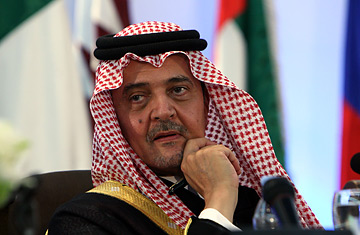
Saudi Arabia's Foreign Minister Prince Saud Al-Faisal
Saudi Arabian Foreign Minister Saud al-Faisal tells TIME that he is optimistic about this week's Middle East peace conference in Annapolis because of what he calls U.S. determination "to see this through." Continuous U.S. mediation in post-conference negotiations, including pressure on Israel, he says, "can turn things around" and lead to a comprehensive settlement before President Bush's term expires in 13 months.
But, speaking in Paris just hours before his scheduled arrival in the U.S., Prince Saud warned Israelis that they would have no peace until Israel withdrew from Arab territories captured in the 1967 war. Saud, who will be the highest-ranking Saudi to ever attend a peace conference with the Jewish state, added that he would not shake the hand of Prime Minister Ehud Olmert or make a symbolic visit to Jerusalem before a peace deal. "The hand that has been extended to us has been a fist so far," he said. He warned Israelis against seeking a surrender, adding, "We don't need a Versailles for the Arab world, a peace that will only be an instigator of future wars."
TIME: Are you optimistic about Annapolis?
Saud: One of the elements of optimism is the sense of determination of the United States to see this through. Peace without the complete and direct involvement of the United States is impossible. The assurance that it is going to be a comprehensive peace that is pursued, to tackle the main issues of borders, Jerusalem, refugees, is certainly one of the elements.
Did you have reservations about attending?
We were fearful of failure. For us, of course, and what the turn of events after a failure would be. But also for the United States. We were anxious that the credibility of the United States is maintained.
Why were you afraid for yourselves?
We have assiduously worked for a strategy for peace. We have convinced our people of the viability of that strategy. If failure occurred, people would turn away from this strategy. Undoubtedly, failure will increase the trend toward radicalism, and undoubtedly it will provide terrorists with further means of recruitment.
Are you confident in the Bush Administration's steering of the peace process?
We have confidence in that. I hope we are proven right. Both sides alone won't reach an agreement. It is obvious from the last 60 years of experience with negotiations. With their continuous involvement, and serious intent, this can turn things around [if the United States really is going to put its weight behind its proposals].
Have Prime Minister Ehud Olmert and Palestinian President Mahmoud Abbas achieved anything in their talks?
No, that is one of the great disappointments. Everybody had hoped by the time they reached the conference, that Olmert and Abbas had reached some kind of understanding especially about what needs to be done on the ground, issues like a freeze on settlements, the wall, and other issues that make Palestinian life easier. How reasonable is it to assume that you can have negotiations for removing the occupation and at the same time the Israelis are acquiring more land and building more settlements? Here is an obvious area where an intermediary has to step in and say, "No, this can't be."
